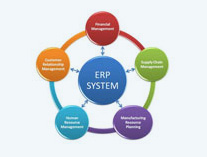Streamlining and Crystallizing Productivity
Project Management is the spring board for technological innovation at Vinculum. We are a seasoned team of professionals with fresh energy and ideas, eager to apply them to your IT projects.According to Carnegie Mellon’s SEI Capability Maturity Model which divides the 5 levels of Capability Maturity rating, Vinculum has achieved a rating in the top percentile among all software vendors.
i) Initial-73% ii) Repeatable-15% iii) Defined-10% Iv) Managed-0.6% v) Optimizing-0.3% (Percentage of SEI audited companies at this level).
Vinculum’s Consultants have varied hard-bought experience, skills and expertise in the following areas of Project Management:
- Planning & Scheduling - project planning, scheduling, and managing.
- Project Mentoring -mentoring teams during different project phases and guiding them through project hurdles to cost effectively achieve deadlines.
- Technology Management -managing and facilitating transfer of knowledge, technology and skills to the clients and leading them to self-sufficiency.
Vinculum Project Management Model
Vinculum model for project management effectively relies on established control procedures to provide senior management, client, and project teams with a transparent system of information flow, status, issues, and problems. This results in cost control, avoiding cost over-runs, and schedule slippage in projects.Vinculum project managers have extensive real-world experience in a variety of projects of varied scope in planning, scheduling, monitoring, controlling and reporting
Objectives
Establish effective project management methods and techniquesProvide a vehicle for disseminating project management guidelines and processes
Stages
Vinculum Project Management is divided into three stages:1. Initiation
2. Execution
3.Wind-up
INITIATION is when the Project Manager prepares estimates, defines deliverables, creates the project plans, organizes project resources and obtains approval for formally initiating the project.
EXECUTION is when the project team produces the system deliverables. During this stage, controlling and monitoring maintain primary importance. However, planning and scheduling is carried out prior to each phase of the project. Also during the execution phase, plans are updated to accommodate delays and contingencies.
WIND-UP is when the project is wrapped up, determined by when the client signs off the final set of deliverables and the software, documentation and quality records of the project archived.
Key Elements
Forming the cornerstones of Vinculum Project Management Model are four key elements:- Phased Approach
- Cooperative Development
- Detailed Planning
- Management by Activity
Phased Approach
The development cycle is divided into phases and each phase by itself is considered to be a complete unit of work. Since project management spans the entire project life cycle, the Project Management Model uses the phased approach for software development. This approach offers several advantages:- Increased control
- Intermediate control points
- Limited risk
- Iterative two-level planning
- Detailed planning for the current phases
- High level planning for the overall project
Cooperative Development
Commitment and involvement from all personnel associated with project development are essential for success. The Project Management Model promotes cooperation by emphasizing the importance of:- Keeping all concerned personnel abreast of the project's progress, shortcomings, successes, and any changes in direction
- Requiring reviews and sign-off before deliverables are released
- Requiring authorization before further project development is initiated
- Involving project personnel as integral players in the team
- Defining responsibilities of project team
Detailed Planning
Project success is rooted in a well thought out and detailed plan. The Project Management Model aids in this regard by:- Emphasizing the need for a two-level iterative approach to planning (i.e., an overall Project Management Plan, that is refined as the project progresses)
- Requiring each phase to be planned in detail before the project can proceed to that phase
- Encouraging the establishment of intermediate checkpoints and deliverables for all phases
- Reiterating the need for management concurrence on changes made to existing plans, particularly those related to the project resource allocation.
Management by Activity
Vinculum methodology for managing software development is activity-based rather than deliverable-based. The completion of an activity is marked with the production of one or more deliverables. The methodology’s success lies in the fact that when an activity is performed effectively, then the associated deliverable results, and at the same time, the importance of the final deliverable is not undermined. This approach not only ensures the repeatability of the process but also establishes intermediate control points.The importance of intermediate control points is especially critical for deliverables requiring considerably longer time to achieve. Control points in this activity-based model help to perform corrective action during the process rather than at the end when the deliverable is ready. Conversely, if the deliverable is produced, the effort required to perform corrective action to remove non-conformities could turn out to be enormous.
The strengths of an activity-based methodology for project management not only stresses the reviewing of deliverables, but also emphasizes the importance of reviewing the process and helps in process improvement.
Consultants - The Strength of Vinculum
At Vinculum, we know that it takes effort and experience to develop expertise. Hence, we carefully screen our consultants to find those with real-world technology experience which they can innovatively apply to clients’ project requirements.Vinculum provides project expertise at all levels and in a wide variety of technologies.
- Project Managers
- Mentors
- Analysts
- Architects
- Designers
- Developers
- QA Engineers
- Configuration Managers
Project Managers
1. Personal characteristics2. Role
3. Responsibilities
4. Skills/Experience
Personal Characteristics
- Organizationally minded
- Works according to detailed plans
- Success oriented
- Willing to take necessary action to resolve a problem, and applies common sense
Role
The Project Manager manages the activities of the project team and works in close partnership with the client, sharing the responsibility for the success of the project. The Project Manager also is accountable for all deliverables the team produces, and manages the project budget and schedule.The Project Manager's responsibilities begin when the project is initiated. The project may or may not include all phases of system development as described in Software Development Life Cycle. In any case, the Project Manager maintains accountability for the project producing quality deliverables on schedule and within budget.
Responsibilities
The Project Manager is responsible for managing the project deliverables and the resources assigned to it that result in the overall success of the project.Skills/Experience
The Project Manager has the expertise to adapt processes to accommodate both the conceptual and concrete nature of system development; from the conceptual nature of design during the analysis phase, to the highly concrete techniques used during the construction and implementation phases. Their expertise enables them to grasp and implement highly complex new concepts, methodology, and technology.Additional skills possessed by the Project Manger include:
- Excellent communication with all levels of the organization, in personal terms, business terms, and information technology terms
- Ability to operate under high pressure and high visibility situations
- Capability to make decisions
- Participation in decisions of operational importance to the organization
- Managing complex relationships
- Excellent time management and organizational skills
- Commands respect rather than demands respect
- Inculcates team spirit
- Insists on accountability within the team so they may:
Maintain a high level of team production
Work as a cohesive team among themselves and with the Project Manager, displaying both competence and commitment
- Demonstrates good understanding of different technologies such as Client/Server, Databases, Distributed Architectures, Middleware, Internet/Intranet, E-Commerce etc.
- Thoroughly understands Total Quality Management Concepts.
- Instrumental in implementing different Processes, Methodologies and Standards such as ISO 9000, IEEE Standards, SEI – CMM, Rational Unified Process etc.
- Expertise in CASE Tool and Project Management Tool
















